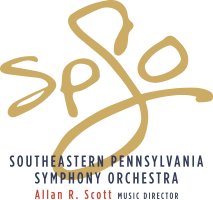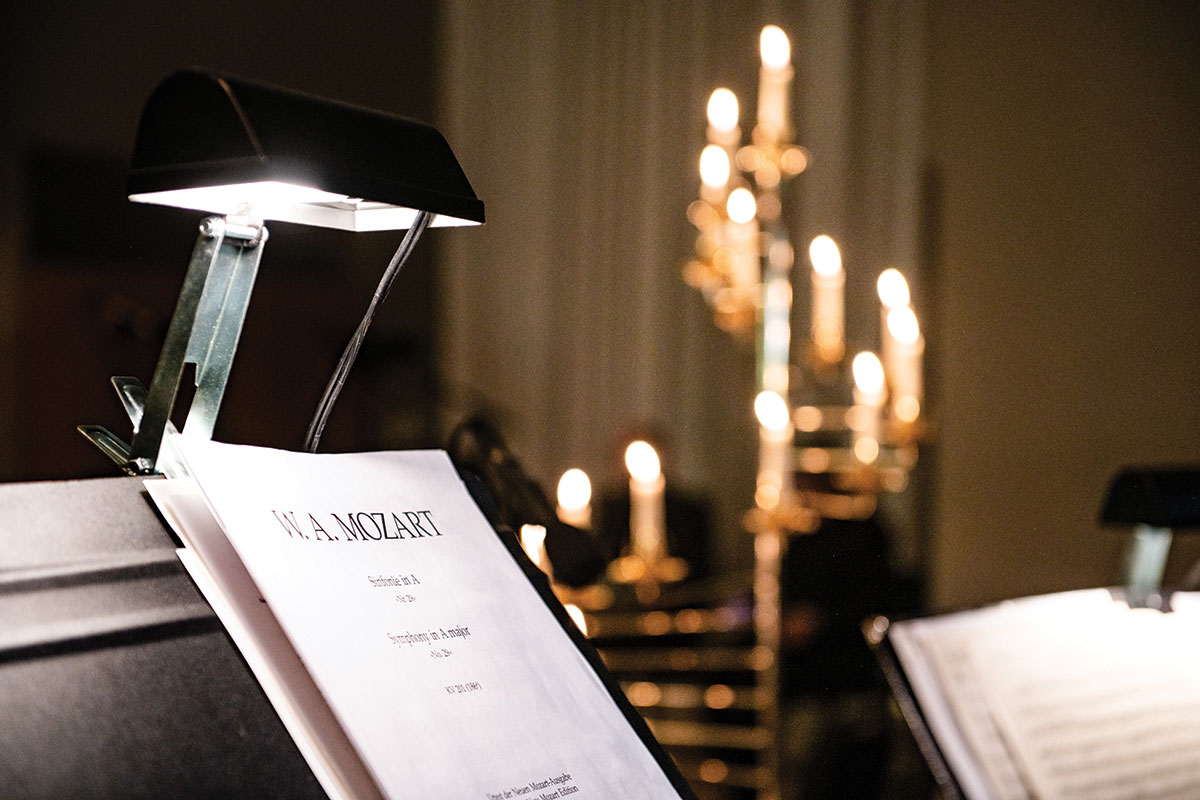On Saturday, 8 November 2025 the Southeastern Pennsylvania Symphony Orchestra presents the annual Mozart By Candlelight at the acoustically wonderful Calvary Baptist Church in Lansdale, PA. Mozart’s sublime and silly Overture to The Magic Flute is coupled with his elegant and adventurous Prague Symphony. The addition of Schubert’s famous “Unfinished” Symphony brings one of the most memorable works of all time to this intimate concert – and all by candlelight. This concert sells quickly, and tickets are on sale now.
As one of the region’s only professional orchestras in southeastern Pennsylvania, the Southeastern Pennsylvania Symphony Orchestra launched its 54th season in October, and tickets for the Masterworks Concert Series on Saturday evenings and the Chamber Music Concert Series on Sunday afternoons are available. The Masterworks Concert Series features world renowned soloists and great symphonic music from Mozart and Mahler to Prokofiev, Copland, Schubert, and Ravel, along with world renowned soloists such as acclaimed Soprano Leah Partridge, celebrated Pianist Young-Ah Tak, and internationally renowned Cellist Ovidiu Marinescu.
The Magic Flute is often known as Mozart’s “Masonic opera” as its libretto is full of symbols and ideas taken from the rituals and philosophy of the Freemasons, and he belonged to the Masonic lodge in Vienna, at a time when the Freemasons were increasingly persecuted by the Austrian government, and The Magic Flute appears to be, if not exactly a propaganda piece, at least an attempt to provide some cheer to their lodge brothers. Mozart wrote the Overture to The Magic Flute just a few days before the first performance and not surprisingly it is one of the finest orchestral works of the 18th century. The opposition of light and darkness, the testing of an initiate seeking enlightenment, the commands to fasting and silence – all these form both The Magic Flute and the Masonic doctrine Mozart knew. Numerical symbolism provides further links to the tenets of Freemasonry, particularly the use of the number three: the opera features three Ladies, three Spirits, three Temples (Reason, Wisdom, and Nature), three trials, and the three chords in the Overture and throughout the opera.
“Rich in sonority, concise in construction, complete with melodic invention, and masterful in harmonic certainty, the Overture balances the seemingly polar opposites of the opera – profundity and comedy – with ease and conviction,” explains Music Director Allan R. Scott.
“In the end, The Magic Flute tells an allegorical story that can be experienced on many levels. On one level, it is an adventure story in which the protagonist wins his love through heroic efforts. On another, and much deeper level, it is a fairy-tale that metaphorically suggests a morality play extolling the virtue of faithfulness against severe trials when in pursuit of a greater good. Perhaps the least obvious point of view may be the most significant to Mozart – a glorification of Freemasonry.”
It was during an invited visit to Prague that Mozart wrote his Symphony No. 38 to honor the occasion and to show appreciation for Prague’s continued loyalty. During the time when the Prague Symphony was composed, Mozart was evolving a new style of composition that reflected a more sophisticated form in both conception and performance. His musical vision was becoming more progressive than that of his contemporaries. The premiere performance of Mozart’s Prague Symphony was a complete success, perhaps in part because one of the last movement’s themes had been borrowed from the popular Marriage of Figaro. Despite Vienna’s reputation for being the cultural capital of Europe, it was the more common people of Prague that saw the cutting-edge talents and genius of Mozart.
By the time Franz Schubert died at the young age of thirty-one he had left almost one thousand compositions of music, and his legacy can easily rest on the 600 plus songs he composed, and his popular Unfinished Symphony. Many scholars speculate why Schubert only composed two movements instead of the conventional four. The romantic notion that Schubert died before finishing the work has been convincingly proven to be false (even though he was diagnosed with syphilis at the time). Others suggest that the very sheer power and majesty of the first two movements discouraged Schubert from adding the final two, and another theory explains that Schubert had always intended to write a two-movement symphony. The most likely reason, however, is that Schubert struggled with the symphonic form that was invented by Haydn, perfected by Mozart, and advanced by Beethoven. The two movements of the Unfinished Symphony are broad enough to be “symphonic” and stand on their own merits.
Masterworks Concert Series
The 2025-2026 Season’s Masterworks Concert Series continues with the Mozart By Candlelight in November and
in February, audiences will experience the heroic grandeur of Beethoven’s immortal Emperor Piano Concerto with noted Pianist Young-Ah Tak as well as the romance, drama, and heartbreak of Prokofiev’s gripping score to Romeo & Juliet.
The Third Symphony of legendary composer Aaron Copland transcends American idealism and offers a promise of hope in the season finale in May. The concert begins with renowned Cellist Ovidiu Marinescu and his own Concerto for Two Cellos featuring the composer and SPSO Principal Cellist Alexandra Paino.
Chamber Music Concert Series
The Chamber Music Concert Series sells out and is a must see add on to the Masterworks Concert Series. This Series allows audiences to experience the musicians of the Southeastern Pennsylvania Symphony Orchestra in an intimate setting within the same performance venue of Calvary Baptist Church. From a piano trio, marimba soloist, wind quintet, and a string quartet these concerts add to the concert experience for the community. The Chamber Music Concert Series launches October 26 with a piano trio and the music of Beethoven and continues throughout the season on Sunday afternoons. Other Chamber Music Concerts include the music of Mozart, Rossini, Bach, Debussy, Ravel, Fauré, and Brahms.
There is something for everyone – symphonic music lovers to chamber music fans – the Southeastern Pennsylvania Symphony Orchestra is here for the community. Experience our music-making!
Calvary Baptist Church has one of the best venues for music. From the accessibility of the venue and generous parking to the incredible acoustics and large seating area, Calvary Baptist Church makes for one of the finest performance venues in the region.


0 Comments